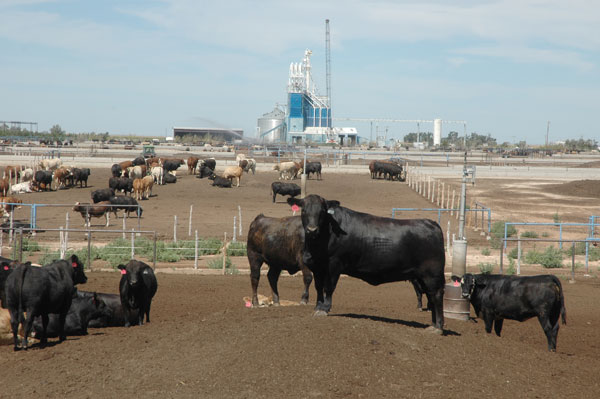Fed Cattle Prices Record-High Again
Rather than drifting lower by the end of March, fed cattle prices continued to gain ground with feedlot supplies remaining current and cold weather continuing to impact availability.
March 29, 2014

Cash fed cattle prices gained as much as $4 this week to reach a record-high $154/cwt. in the Northern Plains.
“Fed cattle prices were expected to drift lower in late March and April on improving weather conditions and seasonally higher supplies of market-ready cattle. So far, however, feedlot supplies remain current and cold weather continues to impact availability,” say Steve Meyer and Len Steiner in Thursday’s Daily Livestock Report.
“Stronger-than-expected fed cattle prices so far this year have encouraged feedlots to market cattle aggressively and to place more cattle on feed,” Derrell Peel, Oklahoma State University Extension livestock marketing specialist, explained in his market comments this week. He notes that February placements were up 15% from the low placement total of last year.
In fact, Peel explains, “Feedlots have placed more cattle four of the past five months, resulting in nearly 600,000 more head of cattle placed compared to the same period one year ago. Relatively large placements in January and February have pushed the March 1 feedlot inventory to an unusual March seasonal peak.”
Subscribe now to Cow-Calf Weekly to get the latest industry research and information in your inbox every Friday!
Rather than suggesting a late peak in fed cattle marketings or bunching of cattle heading into the normal seasonal marketing peak of June, Peel says, “Based on the placement weights, it does not appear that the late March peak in feedlot inventories will result in a late peak in marketings. In fact, my current projections suggest that May marketings will be seasonally strong and may be as large or larger than June marketings.”
Moreover, Peel explains the current incentive to pull feedlot cattle forward will likely continue into April and may extend far enough to pull some May cattle into April.
“Cold and variable weather in March continues to negatively impact animal performance and the impacts may stretch into April,” Peel explains. “All in all, the recent increase in placements suggests only a modest increase in seasonal marketings into May and June. This may add some seasonal price pressure to fed markets going into summer. However, from the current $150/cwt. spring top, such pressure would not likely push summer fed cattle prices below the mid $130s/cwt.”
Meyer and Steiner point out there are other factors unique to this year that are adding support to beef wholesale values. Chief among them is reduced pork production and significantly higher pork prices than expected when the year began (see “Pork Production Remains Murky”).
“Normally, the beef cutout tends to decline between mid May and the end of July,” Meyer and Steiner say. “Seasonally, cattle slaughter increases, while beef demand tends to soften somewhat as summer heat takes its toll on consumer consumption patterns. The increase in cattle placements in the November-February period should eventually show up in the cattle numbers coming to market during the summer months.”
More articles to enjoy:
Readers Swap Calving Stories Of Twins, Triplets & Quadruplets
Kick Off Your Morning With These Cute Calf Photos
Despite All The New Selection Tools, Why Does Calf Birthweight Still Rule?
Grass-Fed Vs. Grain-Fed Ground Beef -- No Difference In Healthfulness
Consumers Hear Only Half The Story On Food-Borne Illness
You Can Control Your Own Level Of Happiness
Skipping The Basics Can Carry A Big Bottom-Line Penalty
10 Farm Trucks To Consider For 2014
Despite Record Prices, Push The Pencil For The Best Selling Option
9 Nifty New Products For Cattle Producers
Leachman’s Industry Game Plan: Work Together To Move Forward
70+ Photos Honor The Hardworking Cowboys On The Ranch
Take A Virtual Feedlot Tour Of Dean Cluck Feedyard
About the Author(s)
You May Also Like




.png?width=300&auto=webp&quality=80&disable=upscale)
